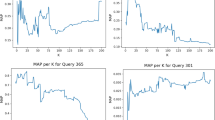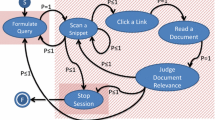Abstract
Much of the research in relevance feedback (RF) has been performed under laboratory conditions using test collections and either test persons or simple simulation. These studies have given mixed results. The design of the present study is unique. First, the initial queries are realistically short queries generated by real end-users. Second, we perform a user simulation with several RF scenarios. Third, we simulate human fallibility in providing RF, i.e., incorrectness in feedback. Fourth, we employ graded relevance assessments in the evaluation of the retrieval results. The research question is: how does RF affect IR performance when initial queries are short and feedback is fallible? Our findings indicate that very fallible feedback is no different from pseudo-relevance feedback (PRF) and not effective on short initial queries. However, RF with empirically observed fallibility is as effective as correct RF and able to improve the performance of short initial queries.
Access this chapter
Tax calculation will be finalised at checkout
Purchases are for personal use only
Preview
Unable to display preview. Download preview PDF.
Similar content being viewed by others
References
Azzopardi, L., Järvelin, K., Kamps, J., Smucker, M.: Report on the SIGIR 2010 Workshop on the Simulation of Interaction. SIGIR Forum 44(2), 35–47 (2010)
Efthimiadis, E.N.: Query expansion. In: Williams, M.E. (ed.) Annual Review of Information Science and Technology ARIST, vol. 31, pp. 121–187. Information Today, Inc., Medford (1996)
Foley, C., Smeaton, A.F.: Synchronous Collaborative Information Retrieval: Techniques and Evaluation. In: Boughanem, M., Berrut, C., Mothe, J., Soule-Dupuy, C. (eds.) ECIR 2009. LNCS, vol. 5478, pp. 42–53. Springer, Heidelberg (2009)
Jansen, M.B.J., Spink, A., Saracevic, T.: Real Life, Real Users, and Real Needs: A Study and Analysis of User Queries on the Web. Information Processing & Management 36(2), 207–227 (2000)
Järvelin, K.: Interactive Relevance Feedback with Graded Relevance and Sentence Extraction: Simulated User Experiments. In: Cheung, D., et al. (eds.) Proceedings of the 18th ACM Conference on Information and Knowledge Management (ACM CIKM 2009), Hong Kong, November 2-6, pp. 2053–2056 (2009)
Keskustalo, H., Järvelin, K., Pirkola, A.: The Effects of Relevance Feedback Quality and Quantity in Interactive Relevance Feedback: A Simulation Based on User Modeling. In: Lalmas, M., MacFarlane, A., Rüger, S.M., Tombros, A., Tsikrika, T., Yavlinsky, A. (eds.) ECIR 2006. LNCS, vol. 3936, pp. 191–204. Springer, Heidelberg (2006)
Keskustalo, H., Järvelin, K., Pirkola, A.: Evaluating the Effectiveness of Relevance Feedback Based on a User Simulation Model: Effects of a User Scenario on Cumulated Gain Value. Information Retrieval 11(5), 209–228 (2008)
Lam-Adesina, A.M., Jones, G.J.F.: Applying Summarization Techniques for Term Selection in Relevance Feedback. In: Proc. of the 24th Annual ACM Conference on Research and Development in Information Retrieval, pp. 1–9. ACM Press, New York (2001)
Marchionini, G., Dwiggins, S., Katz, A., Lin, X.: Information seeking in full-text end-user-oriented search systems: The roles of domain and search expertise. Library and Information Science Research 15(1), 35–70 (1993)
Pirkola, A., Keskustalo, H., Leppänen, E., Känsälä, A.-P., Järvelin, K.: Targeted S-Gram Matching: A Novel N-Gram Matching Technique for Cross- and Monolin-gual Word Form Variants. Information Research 7(2) (2002), http://InformationR.net/ir/7-2/paper126.html
Ruthven, I., Lalmas, M.: A survey on the use of relevance feedback for information access systems. Knowledge Engineering Review 18(2), 95–145 (2003)
Ruthven, I., Lalmas, M., van Rijsbergen, K.: Incorporating user search behaviour into relevance feedback. Journal of the American Society for Information Science and Technology 54(6), 529–549 (2003)
Sihvonen, A., Vakkari, P.: Subject knowledge improves interactive query expansion assisted by a thesaurus. J. Doc. 60(6), 673–690 (2004)
Sormunen, E.: Liberal Relevance Criteria of TREC - Counting on Negligible Documents? In: Proceedings of the 25th Annual International ACM SIGIR Conference on Research and Development in Information Retrieval, pp. 320–330. ACM Press, New York (2002)
Stenmark, D.: Identifying Clusters of User Behavior in Intranet Search Engine Log Files. Journal of the American Society for Information Science and Technology 59(14), 2232–2243 (2008)
Tombros, A., Sanderson, M.: Advantages of query biased summaries in information retrieval. In: Proc. of the 21st Annual ACM Conference on Research and Development in Information Retrieval, pp. 2–10. ACM Press, New York (1998)
Turpin, A., et al.: Including Summaries in System Evaluation. In: Proc. of the 32nd Annual ACM Conference on Research and Development in Information Retrieval, pp. 508–515. ACM Press, New York (2009)
Vakkari, P., Sormunen, E.: The influence of relevance levels on the effectiveness of interactive IR. J. Am. Soc. Inf. Sci. Tech. 55(11), 963–969 (2004)
Author information
Authors and Affiliations
Editor information
Editors and Affiliations
Rights and permissions
Copyright information
© 2011 Springer-Verlag Berlin Heidelberg
About this paper
Cite this paper
Baskaya, F., Keskustalo, H., Järvelin, K. (2011). Simulating Simple and Fallible Relevance Feedback. In: Clough, P., et al. Advances in Information Retrieval. ECIR 2011. Lecture Notes in Computer Science, vol 6611. Springer, Berlin, Heidelberg. https://doi.org/10.1007/978-3-642-20161-5_59
Download citation
DOI: https://doi.org/10.1007/978-3-642-20161-5_59
Publisher Name: Springer, Berlin, Heidelberg
Print ISBN: 978-3-642-20160-8
Online ISBN: 978-3-642-20161-5
eBook Packages: Computer ScienceComputer Science (R0)




